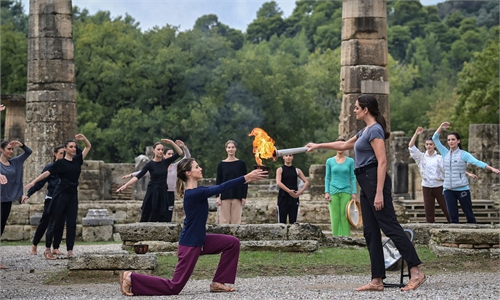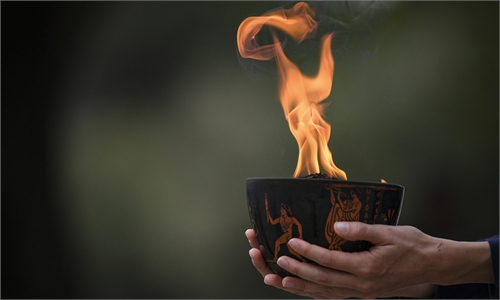Beijing 2022 flame lit, kicking off Winter Olympics time
Beijing shows ‘more maturity’ facing boycott noise from West: expert
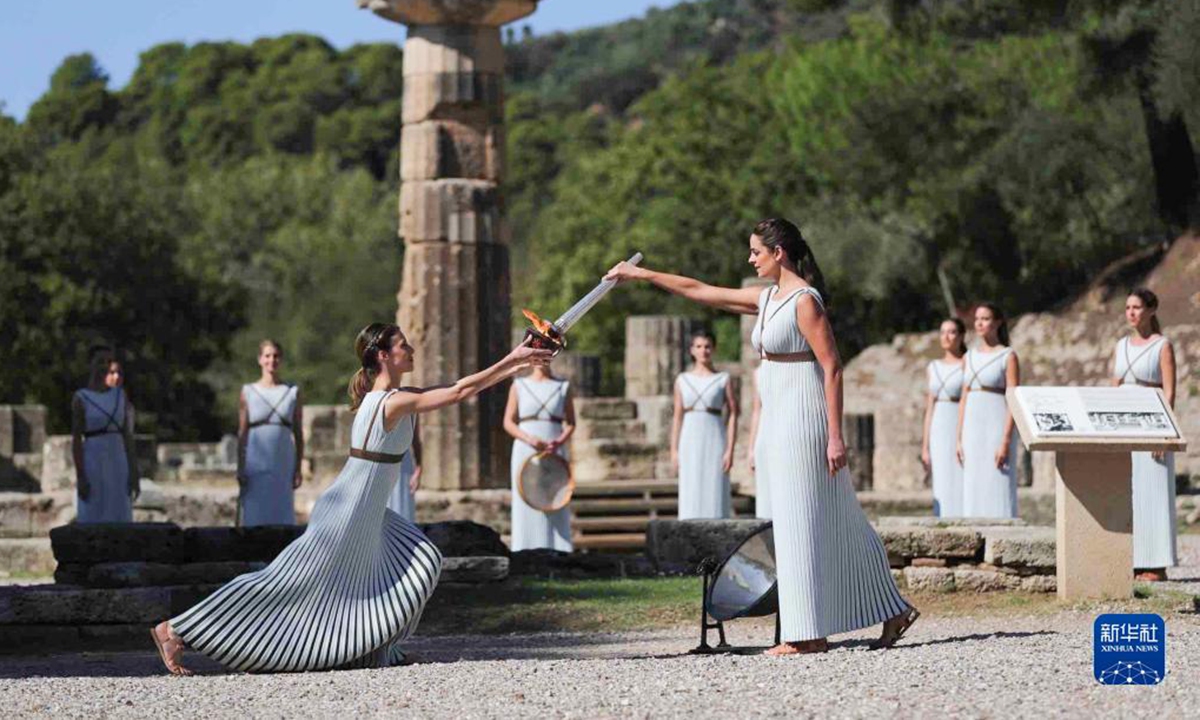
Greek actress Xanthi Georgiou (R, front), playing the role of an ancient Greek High Priestess, lights a cauldron with the Olympic Flame during the Olympic flame lighting ceremony for the Beijing 2022 Winter Olympic Games, in ancient Olympia, Greece, on Monday. Photo: Xinhua
With the red Chinese national flag and the blue Greek flag unfurled under the azure sky at Ancient Olympia, Greece, the Aegean nation was relieved of the gloom brought by rain of last week and basked in sunshine Monday. The lighting of the Olympic flame for the Beijing Winter Olympics in Olympia reminded the world that it is officially entering Winter Olympics time, two months after the Tokyo Games.
At noon local time in Greece, the Olympic flag was raised to the sound of the Olympic anthem over the ruins of the Temple of Hera in Ancient Olympia, where the games were initially born 2,500 years ago.
Dressed in archaic-style clothing, Greek actress Xanthi Georgiou, playing the role of the High Priestess, prayed to Apollo, the Olympian god of the sun and light, and half squatted, lighted the torch in her hand with a concave mirror that focused on the sun's rays.
Greek President Katerina Sakellaropoulou, President of the International Olympic Committee (IOC) Thomas Bach, President of the Hellenic Olympic Committee Spyros Capralos and Vice President of the Beijing Organizing Committee for the Winter Games Yu Zaiqing attended the flame-lighting ceremony on Monday.
Greece skier Ioannis Antoniou, as the first torch bearer, passed the Olympic flame to Chinese short track speed skater Li Jiajun, a four-time Olympian. The third leg of the torch relay will be held at the Panathenaic Stadium in Athens on Tuesday before the Hellenic Olympic Committee hands it over to the Beijing Olympic delegation. The flame will then be preserved before leaving for China the same day.
Yu said that for thousands of years, the sacred Olympic flame has spread the light of unity, friendship, peace and justice to the world, witnessed the history of human development and exchanges. In the face of the coronavirus, the Olympic flame has once again brought confidence, warmth and hope to people, rallying a mighty force to jointly defeat the epidemic, Yu said.
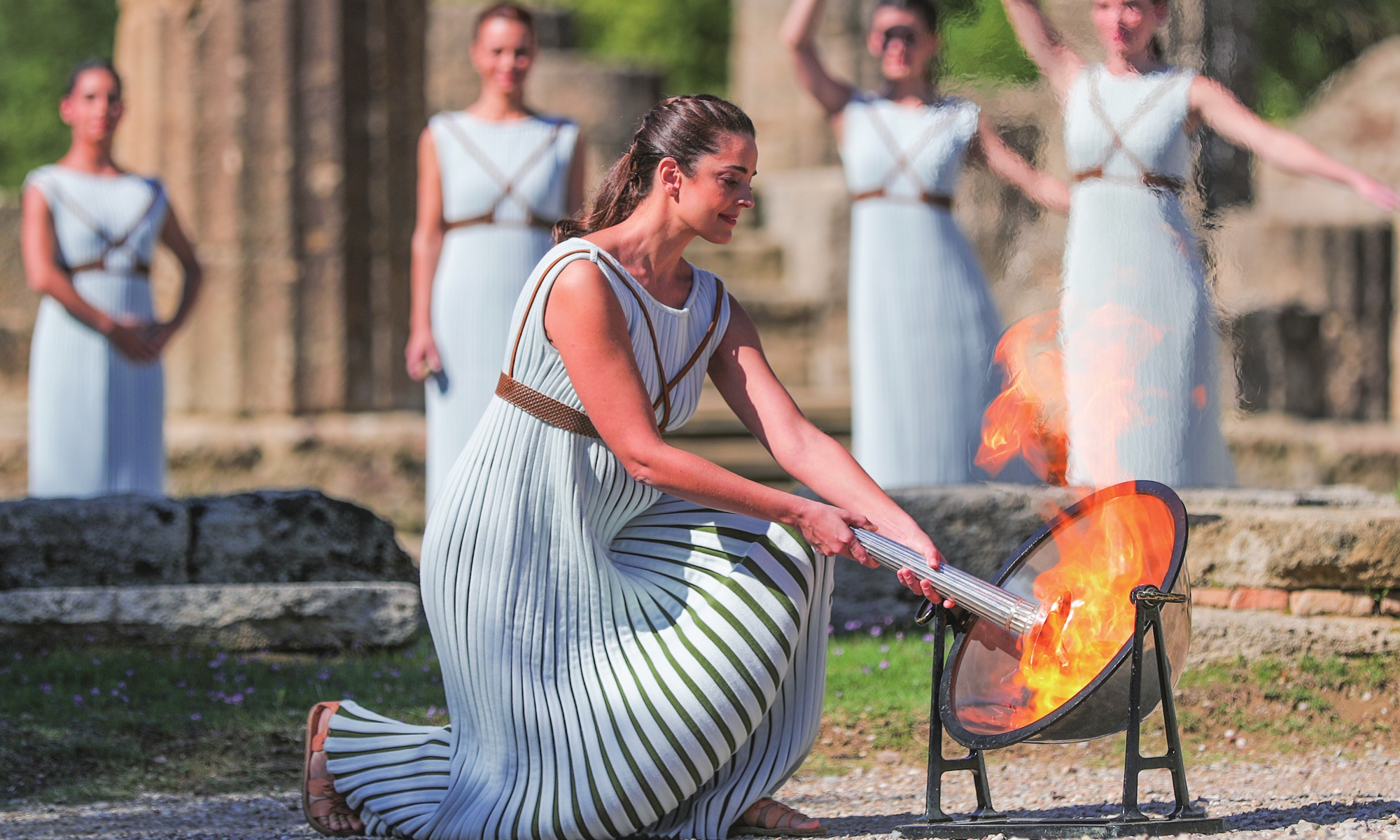
Greek actress Xanthi Georgiou (R, front), playing the role of an ancient Greek High Priestess, lights a cauldron with the Olympic Flame during the Olympic flame lighting ceremony for the Beijing 2022 Winter Olympic Games, in ancient Olympia, Greece, on Monday. Photo: Xinhua
On March 30, 2008, the torch handover for the Beijing Olympic Games was held in the Panathenaic Stadium.
Thirteen years later, the Chinese capital is moving a step closer to becoming the first city in the world to hold both the Summer Olympic Games and Winter Games.
A Global Times reporter learned on Monday that activities like the torch display, the announcement of the torch relay route in China and the official start of the torch relay in China will be held on Wednesday.
IOC President Bach told the Chinese media earlier that he is impressed by the preparations for the Beijing Winter Olympics and the progress it has made despite the COVID-19 pandemic.
Bach said the feedback from the athletes after participating in the tests in Beijing has been very positive, so "we are confident in the success of the Beijing Winter Olympics."
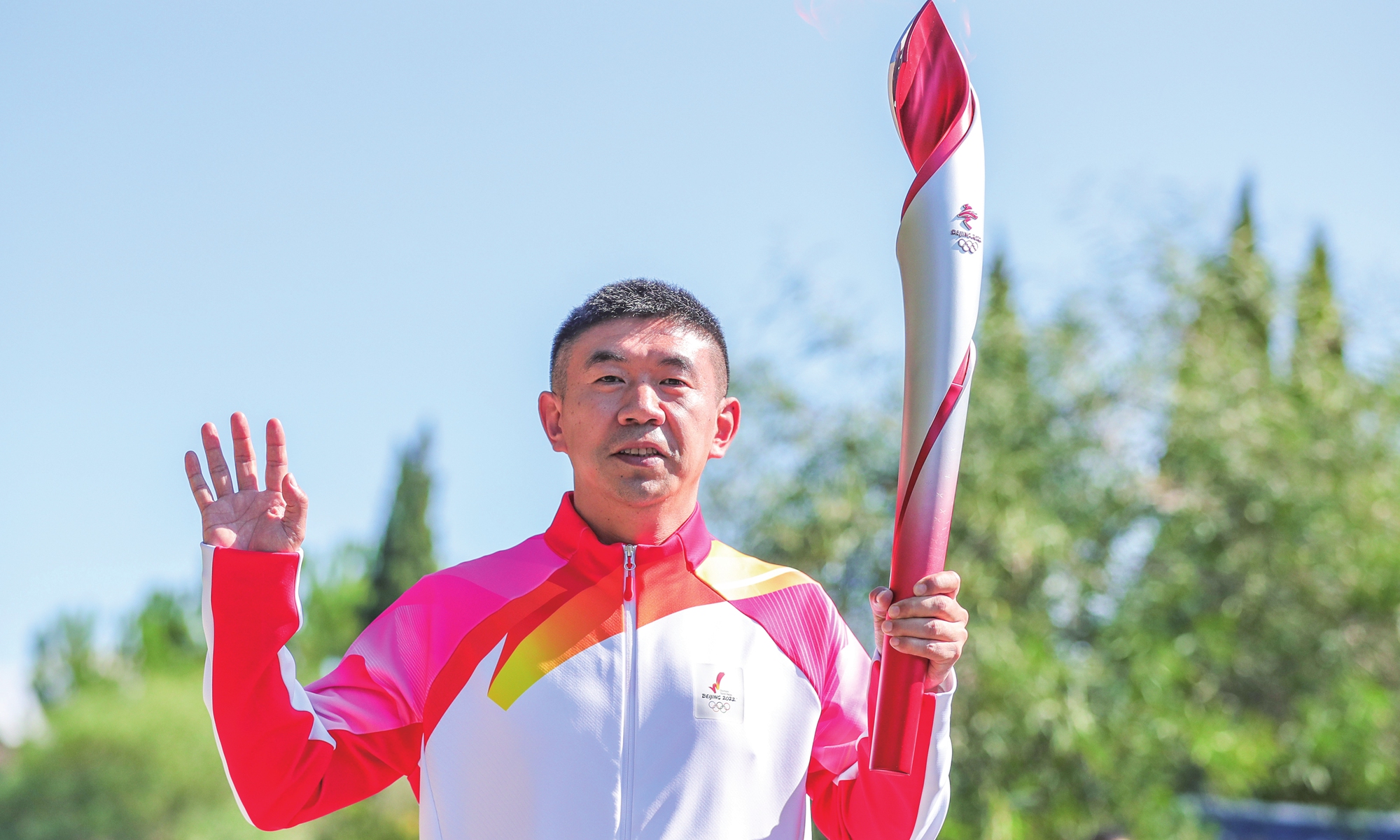
The second torchbearer, former Chinese short-track speed skater Li Jiajun, carries the torch after collecting the flame. Photo: Xinhua
Difference and similarity
Like the previous Olympic events, various activists took the opportunity to make a scene. One day before the flame-lighting ceremony, two women attempting to hang banners advocating Hong Kong and Xizang secession at the Acropolis in Athens were arrested by Greek police. The two activists are US citizens and members of the "No Beijing 2022" campaign, the AP reported on Sunday.
In the past few months, groundless accusations and boycott calls against the Beijing Winter Olympics have been made by the US Congress, the Canadian parliament and the European parliament, as well as some Western human rights groups, on the excuse of issues related to Xinjiang, Xizang (Tibet), Taiwan and Hong Kong. This was similar to the trend before the 2008 Beijing Olympics. But so far, no country has announced a "diplomatic boycott" of the Games, no sponsors or companies have pulled out of the Games, and no athletes have dropped out.
Media reports in the past month said Russian President Vladimir Putin was the first head of state to confirm attendance at the Games.
In his address on Monday, Bach said the Olympic movement had a peaceful mission since ancient times and demanded people respect the political neutrality of the Olympic Games. And only by ensuring political neutrality can the Games transcend political divisions of the present era and build bridges and friendships between nations and regions.
Media reported that three activists sneaked into the archaeological site in an attempt to protest the so-called China's human rights records, but the flame-lighting ceremony went relatively smoothly in warm weather, with some local residents leisurely drinking coffee on the streets.
A guard who took charge of security for the flame-lighting event told the Global Times on Monday that about 100 security personnel, not only local police from Olympia, but also from various places in Greece, participated in Monday's operations.
The global torch relay for the 2008 Beijing Olympics was disrupted by riots in places such as Paris. There will be no global torch relay for 2022 Winter Games due to COVID-19 restrictions. The torch relay route for Tokyo Olympic Games 2020 was also limited in Japan.
In April 4, 2008, the Beijing Olympics torch relay in Paris has been disrupted by a small number of Xizang secessionists. During the 13th leg of the torch relay, rioters tried to snatch the torch from the torchbearers. Local police said at least five rioters were arrested.
Henri Serandour, a past president of the French National Olympic Committee, slammed the destructive actions from Xizang secessionists, stressing that the Olympic torch sends a message of peace to the world and blocking its passage is a lack of respect for the fundamental freedoms of the athletes who carry it.
Compared with 2008, China today, with a growing status and influence and broader vision, is taking more responsibility. China hopes to provide a platform and positive influence for the world through hosting the Winter Olympics, which reflects the role of a major power amid the pandemic," Ren Hai, a professor at the Olympic Research Center of Beijing Sports University, told the Global Times on Monday, noting China is showing more maturity and wisdom in dealing with accusations and boycott calls from the West.
The Olympic Games have always been a platform for human society to enjoy sports and to communicate with each other. And its role is being highlighted especially under the shadow of the COVID-19 pandemic, as human beings have never needed it more than now. "Attempts to turn the Olympics into a political tool are against the purpose of the Games and will not be supported by the international community," Ren said.
It is "almost impossible" for any country's national Olympic committee to boycott the Beijing Winter Olympics due to the IOC constitution, experts said.
The IOC constitution states that national Olympic committees that boycott the Olympics may be subject to sanctions, including the inability to participate in future editions of the Games.
National Olympic committees of countries are relatively independent, Ren said. "The intervention of governments and politicians has little impact on the Olympic committees."
"The Olympic Games are very important for athletes, and it would be unacceptable for any country to use them as a political tool to delay their athletes' participation for four years," Ren said.


